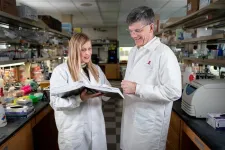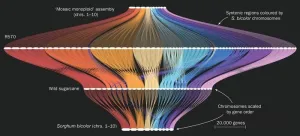(Press-News.org) GRAND RAPIDS, Mich. (March 27, 2024) — A pair of medications that make malignant cells act as if they have a virus could hold new promise for treating colorectal cancers and other solid tumors, reports a study published today in Science Advances.
The preclinical research, led by Van Andel Institute scientists, determined how low doses of a DNMT inhibitor sensitize cancer cells to an EZH2 inhibitor, resulting in a one-two punch that combats cancer cells better than either drug alone.
The findings are the foundation for an upcoming Phase I clinical trial to evaluate this combination in people with colorectal cancer or other solid tumors.
“DNMT inhibitors are approved to treat blood cancer while EZH2 inhibitors are approved to treat blood cancer and a rare type of sarcoma. To date, they’ve had limited individual success in solid tumors like colorectal cancer,” said Van Andel Institute Professor Scott Rothbart, Ph.D., the study’s corresponding author. “Our findings highlight the promise of combination cancer therapies by revealing how these two medications interact, with the DNMT inhibitor priming cancer cells in a way that makes the EZH2 inhibitor more effective.”
DNMT and EZH2 inhibitors work by controlling the epigenetic processes that regulate gene expression. In cancer, epigenetic errors enable malignant cells to survive and proliferate — and offer critical targets for treatment.
Previous studies show that DNMT inhibitors cause cancer cells to behave as if infected by a virus, which makes the cells more susceptible to attack by one’s own immune system. In their new study, Rothbart and colleagues demonstrated that combining DNMT and EZH2 inhibitors activate this viral mimicry process more effectively than either drug on its own. The upcoming trial will be the first time these two medication types will be combined to enhance the activities of these inhibitors in solid tumors.
Colorectal cancers are the second leading cause of cancer death globally, according to the World Health Organization. More than 1.9 million cases were diagnosed in 2020, with incidence expected to rise to 3.2 million cases by 2040. Although screening and early detection have driven down colorectal cancer rates among older people in the U.S., rates are rising in younger people.
“Although it is not clear why colorectal cancer cases are rising among young people, it is clear that we need more effective treatment strategies,” Rothbart said. “Combining medications may be a powerful way to simultaneously target multiple drivers of cancer. In addition to revealing how DNMT and EZH2 inhibitors work together, our findings suggest that epigenetic drugs also may sensitize tumors to immunotherapy, which offers another important opportunity to enhance cancer treatment.”
The upcoming trial will be supported by the Van Andel Institute–Stand Up To Cancer© (SU2C) Epigenetics Dream Team, a multi-institutional collaboration that evaluates promising potential combination therapies for cancer, and a National Cancer Institute Specialized Programs of Research Excellence (SPORE) award, a prestigious five-year grant that supports a team of scientists seeking to improve epigenetic cancer therapies.
Today’s findings were made possible in part by a SPORE-supported subproject on DNMT and EZH2 inhibitors led by Rothbart and Stephen Baylin, M.D., of Johns Hopkins University and Van Andel Institute. Baylin also serves as co-leader of the VAI–SU2C Epigenetics Dream Team and is an author on today’s study.
The study’s first authors are Alison A. Chomiak, Ph.D., and Rochelle L. Tiedemann, Ph.D., of VAI. Other authors include Yanqing Liu, M.D., Ashley K. Wiseman, M.S., and Kate E. Thurlow, M.Sc., of VAI; Xiangqian Kong, Ph.D., Ying Cui, Ph.D., and Michael E. Topper, Ph.D., of Johns Hopkins University; and Evan M. Cornett, Ph.D., of Indiana University.
Research reported in this publication was supported by the National Cancer Institute of the National Institutes of Health under award nos. P50CA254897 (Issa, Baylin and Jones; sub-project 7830, Rothbart) and F32CA225043 (Chomiak); and the National Institute of General Medical Sciences of the National Institutes of Health under award no. R35GM124736 (Rothbart). Scott Rothbart, Ph.D., was supported by a Research Scholar Grant (RSG-21-031-01-DMC) from the American Cancer Society. Rochelle L. Tiedemann, Ph.D., was supported by the American Cancer Society–Michigan Cancer Research Fund Postdoctoral Fellowship (PF-16-245-01-DMC). The content is solely the responsibility of the authors and does not necessarily represent the official views of the National Institutes of Health or other funders.
###
ABOUT VAN ANDEL INSTITUTE
Van Andel Institute (VAI) is committed to improving the health and enhancing the lives of current and future generations through cutting edge biomedical research and innovative educational offerings. Established in Grand Rapids, Michigan, in 1996 by the Van Andel family, VAI is now home to more than 500 scientists, educators and support staff, who work with a growing number of national and international collaborators to foster discovery. The Institute’s scientists study the origins of cancer, Parkinson’s and other diseases and translate their findings into breakthrough prevention and treatment strategies. Our educators develop inquiry-based approaches for K–12 education to help students and teachers prepare the next generation of problem-solvers, while our Graduate School offers a rigorous, research-intensive Ph.D. program in molecular and cellular biology. Learn more at vai.org.
END
A new way of imaging the brain with magnetic resonance imaging (MRI) does not directly detect neural activity as originally reported, according to scientists at MIT’s McGovern Institute. The method, first described in 2022, generated excitement within the neuroscience community as a potentially transformative approach. But a study from the lab of McGovern associate investigator Alan Jasanoff, reported March 27, 2024, in the journal Science Advances, demonstrates that MRI signals produced by the new method are generated in large part by the imaging process itself, ...
“We find that a more sustainable, flexitarian diet increases the feasibility of the Paris Agreement climate goals in different ways,” says Florian Humpenöder, PIK scientist and co-lead author of the study to be published in Science Advances. “The reduction of greenhouse gas emissions related to dietary shifts, especially methane from ruminant animals raised for their meat and milk, would allow us to extend our current global CO2 budget of 500 gigatons by 125 gigatons and still stay within the limits of 1.5°C with a 50 percent chance,” he adds.
Putting a price on greenhouse gas (GHG) emissions ...
There are several factors that play an important role in the development of floods: air temperature, soil moisture, snow depth, and the daily precipitation in the days before a flood. In order to better understand how individual factors contribute to flooding, UFZ researchers examined more than 3,500 river basins worldwide and analysed flood events between 1981 and 2020 for each of them. The result: precipitation was the sole determining factor in only around 25% of the almost 125,000 flood events. Soil moisture was the decisive factor in just over 10% of cases, and ...
A systematic review of 35 years of global medical literature finds a spectrum of reasons why people sell kidneys. The study, by Bijaya Shrestha of the Center for Research on Education, Health and Social Science, Kathmandu, Nepal, finds limited efforts toward mitigating the problem as well as a lack of evidence around the impact of policy and biotechnology. It is published in the open access journal PLOS Global Public Health.
Demand for kidney donation is higher than supply, and it has become one of the most saleable human ...
St. Jude Children’s Research Hospital scientists reversed an aggressive cancer, reverting malignant cells towards a more normal state. Rhabdoid tumors are an aggressive cancer which is missing a key tumor suppressor protein. Findings showed that with the missing tumor suppressor, deleting or degrading the quality control protein DCAF5 reversed the cancer cell state. These results suggest a new approach to curing cancer — returning cancerous cells to an earlier, more normal state rather than killing cancer cells with toxic therapies — may be possible. The results were published today in Nature.
“Rather than making a toxic event that kills rhabdoid ...
SAN ANTONIO — March 27, 2024 —Southwest Research Institute is leading two groundbreaking experiments — on the ground and in the air — to collect astronomical data from the total solar eclipse that will shadow a large swath of the United States on April 8, 2024. SwRI’s Dr. Amir Caspi leads the Citizen Continental-America Telescopic Eclipse (CATE) 2024 experiment, a broad scientific outreach initiative funded by the National Science Foundation (NSF) and NASA, that will ...
New multidisciplinary research from the University of St Andrews could lead to more efficient televisions, computer screens and lighting.
Researchers at the Organic Semiconductor Centre in the School of Physics and Astronomy, and the School of Chemistry have proposed a new approach to designing efficient light-emitting materials in a paper published this week in Nature (27 March).
Light-emitting materials are used in organic light-emitting diodes (OLEDs) that are now found in the majority of mobile ...
Modern hybrid sugarcane is one of the most harvested crops on the planet, used to make products including sugar, molasses, bioethanol, and bio-based materials. It also has one of the most complex genetic blueprints.
Until now, sugarcane’s complicated genetics made it the last major crop without a complete and highly accurate genome. Scientists have developed and combined multiple techniques to successfully map out sugarcane’s genetic code. With that map, they were able to verify the specific location that provides resistance to the impactful brown rust disease ...
WASHINGTON — The Wide-field Imager for Parker Solar Probe (WISPR) Science Team, led by the U.S. Naval Research Laboratory (NRL), captured the development of turbulence as a Coronal Mass Ejection (CME) interacted with the ambient solar wind in the circumsolar space. This discovery is reported in the Astrophysical Journal.
Taking advantage of its unique location inside the Sun’s atmosphere, the NRL-built WISPR telescope on NASA’s Parker Solar Probe (PSP) mission, operated by the Johns Hopkins University Applied Physics Laboratory (JHUAPL), captured in unparalleled detail the interaction between ...
Four years after the U.S. shut down in the face of the COVID-19 pandemic, research from Rice University suggests undocumented immigrants’ mental health challenges were compounded due to stresses stemming from their unauthorized status.
“Implications of Undocumented Status for Latinx Families During the COVID-19 Pandemic: A Call to Action” appears in the Journal of Clinical Child & Adolescent Psychology and examines how undocumented immigrants navigated the COVID-19 pandemic.
During a series of in-depth interviews with undocumented individuals or those from ...








